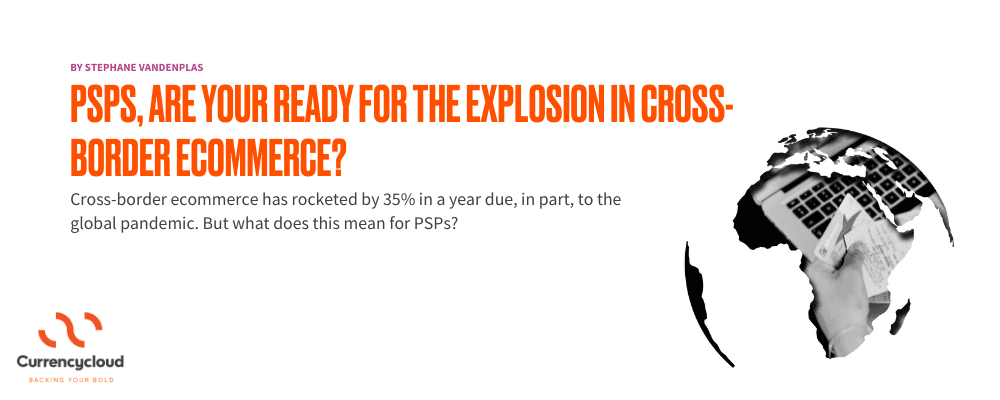
The pandemic saw a remarkable increase in online retail spending in 2020, but also an explosion in cross-border ecommerce that looks set to be a game changer for the way the world shops. In just one year the cross-border ecommerce market in Europe increased 35%, with the UK becoming the third most popular market for online cross-border shopping, topped only by the US and China.
The online shopping habits acquired during lockdown show no signs of slowing down. According to a recent Forrester report, cross-border ecommerce is set to triple in value to $736bn by 2023. This is, of course, great news for merchants who have a whole new world of consumers to tap into. Traditional brick and mortar retailers, who’ve already adapted to taking online card payments during the pandemic, are now also hungry to have a piece of the cross-border ecommerce pie and reap the rewards of more customers.
It’s the Acquiring banks and Payment Service Providers (PSPs) who are able to help their customers, the merchants, take advantage of the opportunities offered by cross-border ecommerce who will be most in demand. They will be essential to helping merchants truly benefit from this new era in retail.
The traditional market for cross-border commerce has made it challenging for PSPs to optimize their cross-border proposition, especially when serving the needs of their growing SME merchant base. The banking model for cross-border payments has historically involved hidden fees, high costs, delays and reconciliation issues, and continues to do so.
With the boom in cross-border ecommerce and a more geographically diverse client base, PSPs and acquirers will need to support a wider set of settlement currencies or face being supplanted by more agile players in the market. Similarly, with their merchants targeting an increasingly global consumer base, payment providers must be able to collect funds in more currencies or they will be seen as a hindrance to growth.
With payment volumes continuing to increase exponentially, the revenue opportunities of taking control of the FX can not be ignored. As processing margins are being squeezed and with the landscape continuing to become more competitive, carving out a new revenue stream is more necessary than ever.
PSPs and Acquirers can stand out in the cross-border ecommerce world by delivering additional value to their merchants. Providing multi-currency payments accounts is a very effective way of doing just that. It’s logical really. Merchants are now more likely than ever to have both customers and suppliers globally, making a multi-currency solution of increasing value to them.
Not only should PSPs look to access competitive FX rates and optimize settlements via local payment route networks to optimize their cross-border offering, potentially the most important value-add for payment providers to offer their merchants are unique, named multi-currency accounts.
Companies like Revolut, Flutterwave and Sezzle already use Currencycloud to simplify business in a multi-currency world. Using Currencycloud’s APIs, PSPs and Acquirers can provide real value for merchants who want to take advantage of cross-border commerce by offering them a multi-currency virtual account. This gives them access to more than 35 currencies – all from one account, in their name, with no need to manage multiple providers.
This ‘bank in a box’ solution not only opens up exciting new markets and increased revenue streams for the payment providers, it also adds real value to their customer offering. It’s a win-win. PSPs and Acquirers get to offer an innovative cost-saving product to merchants, all while creating new revenue streams for themselves.
It’s true the ecommerce cross-border ecosystem is growing fast. But that doesn’t mean that PSPs and Acquirers can’t catch up.
Feel free to reach out if you’re interested in discussing how Currencycloud can help PSPs and Acquirers optimize their cross-border offering.
[Written by Stephane Vandenplas]
The Payments Association
St Clement’s House
27 Clements Lane
London EC4N 7AE
© Copyright 2024 The Payments Association. All Rights Reserved. The Payments Association is the trading name of Emerging Payments Ventures Limited.
Emerging Ventures Limited t/a The Payments Association; Registered in England and Wales, Company Number 06672728; VAT no. 938829859; Registered office address St. Clement’s House, 27 Clements Lane, London, England, EC4N 7AE.







Log in to access complimentary passes or discounts and access exclusive content as part of your membership. An auto-login link will be sent directly to your email.
We use an auto-login link to ensure optimum security for your members hub. Simply enter your professional work e-mail address into the input area and you’ll receive a link to directly access your account.
Instead of using passwords, we e-mail you a link to log in to the site. This allows us to automatically verify you and apply member benefits based on your e-mail domain name.
Please click the button below which relates to the issue you’re having.
Sometimes our e-mails end up in spam. Make sure to check your spam folder for e-mails from The Payments Association
Most modern e-mail clients now separate e-mails into different tabs. For example, Outlook has an “Other” tab, and Gmail has tabs for different types of e-mails, such as promotional.
For security reasons the link will expire after 60 minutes. Try submitting the login form again and wait a few seconds for the e-mail to arrive.
The link will only work one time – once it’s been clicked, the link won’t log you in again. Instead, you’ll need to go back to the login screen and generate a new link.
Make sure you’re clicking the link on the most recent e-mail that’s been sent to you. We recommend deleting the e-mail once you’ve clicked the link.
Some security systems will automatically click on links in e-mails to check for phishing, malware, viruses and other malicious threats. If these have been clicked, it won’t work when you try to click on the link.
For security reasons, e-mail address changes can only be complete by your Member Engagement Manager. Please contact the team directly for further help.